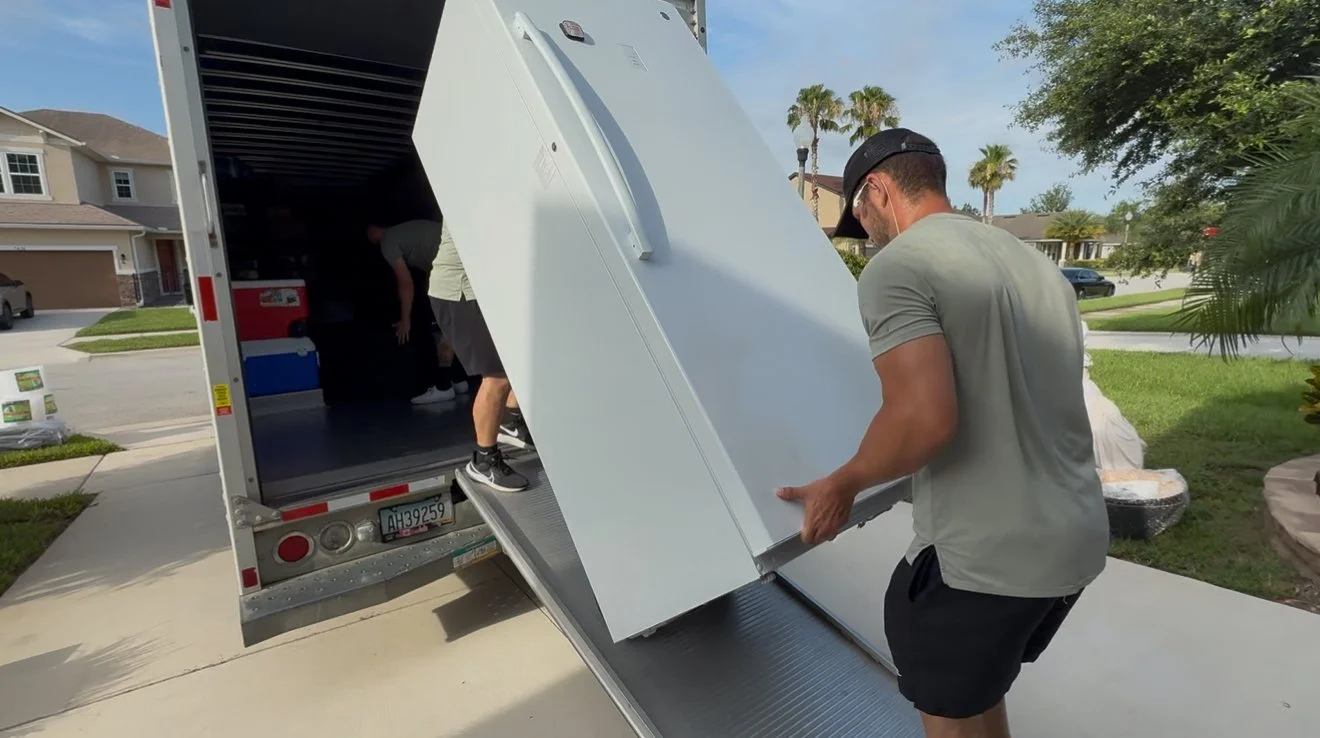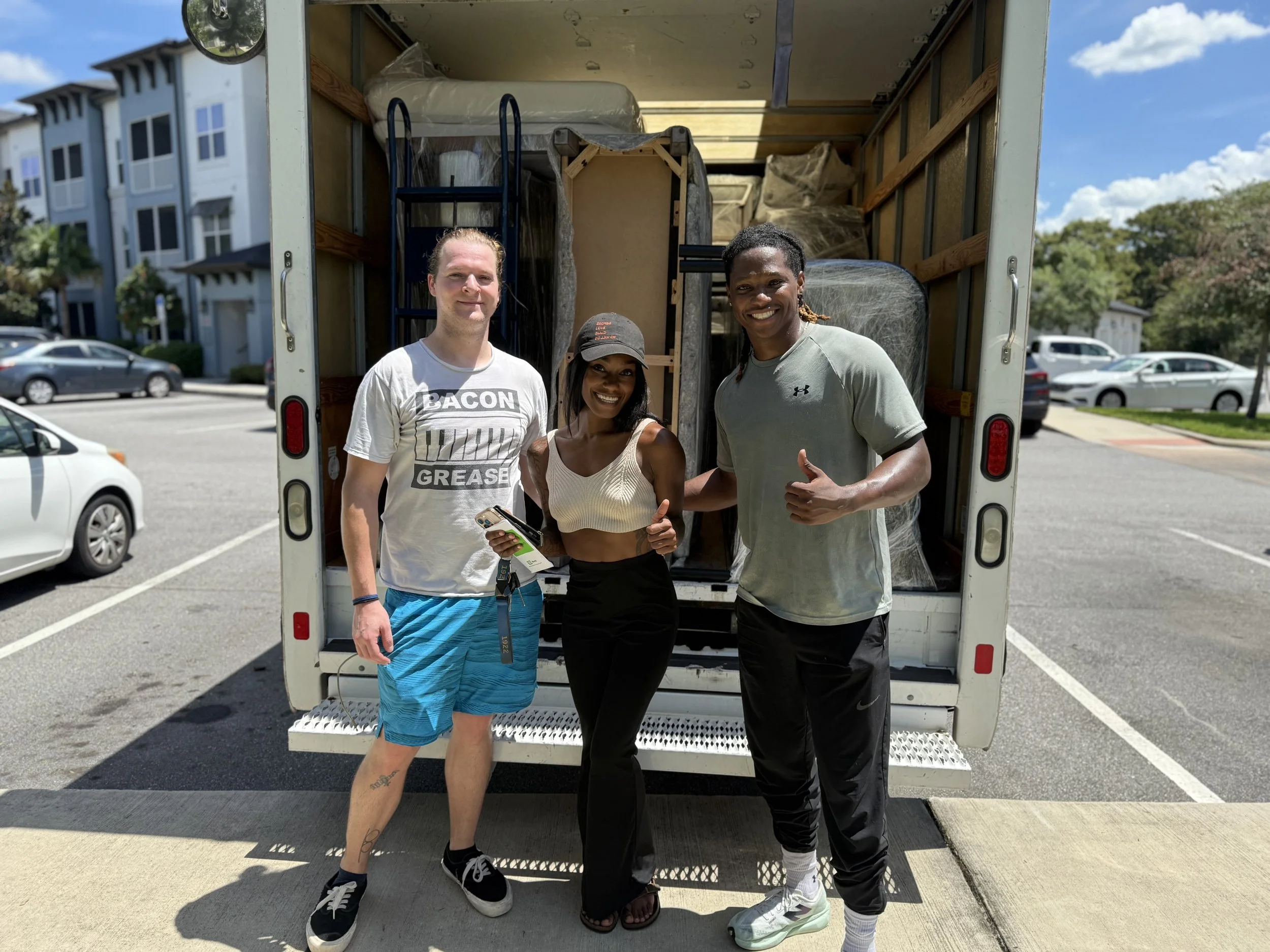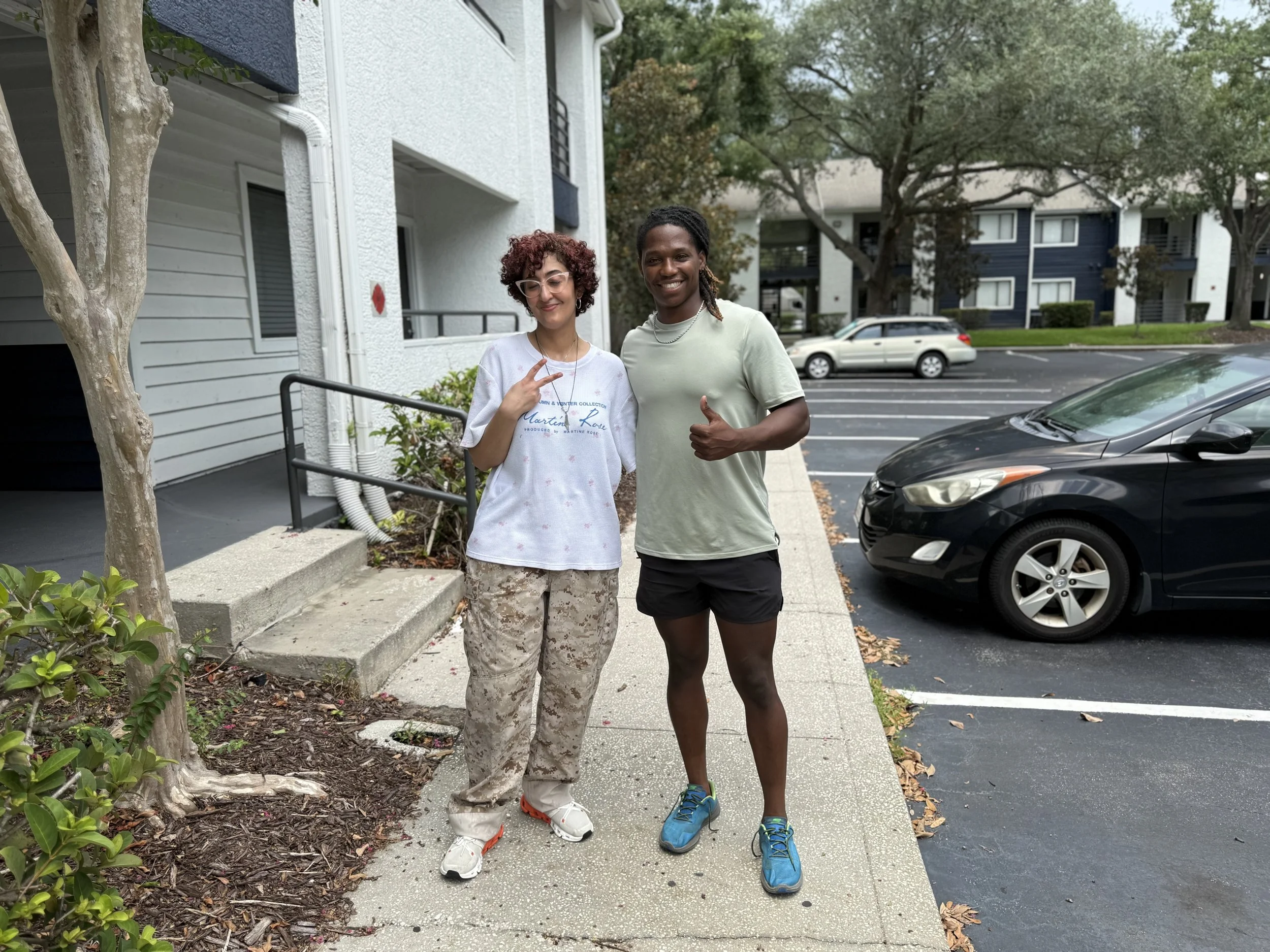The Ultimate Guide to Booking Movers in Orlando (2025–2026)
Orlando continues to attract new residents in droves – it’s consistently ranked among the top searched moving destinations in Florida movebuddha.com. With so many people relocating to “The City Beautiful,” knowing how to book a mover in Orlando is essential. In fact, Central Florida consumers are doing their homework; over 100,000 inquiries were made to the Better Business Bureau about movers in 2024 alone clickorlando.com. This comprehensive guide will walk you through the process step by step, highlight what to look for in a local moving company, and flag common mistakes to avoid. Whether you’re moving out of a downtown high-rise or a suburban home, we’ll also show why Dolly Men Moving Labor stands out as a top choice for Orlando residents. Let’s dive in and make your Orlando move smooth and stress-free!
Step-by-Step: How to Book a Mover in Orlando
1. Plan Your Move Timeline (and Consider Seasons).
Start by determining when you need to move and if your timing is flexible. Orlando’s busiest moving season is typically May through September – families take advantage of summer break, and home listings peak in spring lifestyle-moving.com. Keep in mind that summer in Central Florida means extreme heat (and almost-daily afternoon thunderstorms), and higher demand can drive up prices by 20–30% during peak months lifestyle-moving.com. If possible, schedule your move for the cooler off-peak months (October–April) when demand (and rates) are lower and weather disruptions are minimal lifestyle-moving.com. However, be cautious around hurricane season (June–Nov) – storms can cause delays, so have a backup plan if a tropical system threatens your move lifestyle-moving.com. Planning your timeline early will help you avoid last-minute scrambling and allow you to book the best movers for your preferred date.
2. Research Orlando Moving Companies.
Next, make a list of reputable moving companies in the Orlando area. Ask friends, family, or neighbors for recommendations, especially if they’ve had positive experiences. Look at online reviews (Google, Yelp, Angi) and check each company’s Better Business Bureau (BBB) rating for any patterns of complaints. (Central Florida saw 718 complaints filed against movers in 2024 clickorlando.com, so a quick reputation check is worth it!). Shortlist a few well-reviewed movers that serve your area and type of move. For instance, if you’re moving from a high-rise downtown condo, focus on companies known for apartment moves; if you’re just hiring labor to load a U-Haul, seek out specialized moving labor providers. Taking time to research now will give you peace of mind later.
3. Verify Licensing and Insurance.
Florida law requires all intrastate moving companies to be registered with the state (FDACS) and carry proper insurance floridarealtors.org. Unfortunately, not every company advertising “cheap moves” is actually licensed – so don’t skip this step. To confirm a mover’s credentials, use the Florida Department of Agriculture’s online lookup tool to search by company name or license number clickorlando.com. A legitimate Orlando moving company will have a Florida IM number (intrastate mover registration) and should also be able to provide their USDOT number if they do interstate moves. Proper insurance is a must as well – reputable movers carry cargo insurance for your belongings, liability coverage for property damage, and workers’ compensation for their crew moveitmoveitmovers.com.
Tip: Steer clear of any movers who hesitate to show proof of licensing or insurance. Verifying these credentials protects you from rogue operators and moving scams and ensures you’re entrusting your belongings to professionals approved to operate in Florida.
4. Get Quotes (Preferably In-Writing and In-Person).
Once you have a shortlist of 3–5 good Orlando movers, reach out for estimates. Be ready with details about your move: locations, home size (number of bedrooms), any large or specialty items (piano, safes, etc.), and whether you need packing services or just loading/unloading. Aim to get at least three quotes for comparison clickorlando.com. Many movers will offer a free in-home or virtual survey to assess your belongings – take advantage of this for the most accurate quote. When reviewing estimates, make sure everything is in writing: the rate (hourly or flat), what services are included, the estimated hours or weight, any additional fees (for example, for stairs, long carries, or assembly), and the proposed date. Florida’s new moving consumer protection law now requires movers to provide detailed, transparent contracts outlining all potential costs and terms floridarealtors.org. This is to your benefit – read the contract carefully before you sign. If something is unclear, ask questions. A professional mover will be happy to explain and put any promises in writing. By comparing quotes side by side, you can evaluate which company offers the best value (not just the lowest price) for the scope of your move.
5. Watch for Red Flags and Choose Your Mover Wisely.
As you gather quotes, be on the lookout for warning signs. If a bid is dramatically lower than others, be cautious – “too good to be true” offers often signal cut corners or future surprise charges clickorlando.com. Some less-reputable outfits lure customers with low estimates, only to double the price on moving day. Also, confirm whether you’re dealing with a moving broker or the actual moving company. A broker might sell your move to a third party you know nothing about – you’ll have more control and accountability dealing directly with a licensed carrier clickorlando.com. Trust your instincts and the research you did: choose the Orlando mover that is licensed and insured, has solid reviews, communicated clearly, and gave a fair, transparent quote. Before finalizing the booking, ensure you understand the company’s policies (e.g. deposit required, cancellation or reschedule terms, how they handle damages). Once you’ve decided, lock in your moving date with the company by signing the agreement and paying any required deposit. The best movers’ calendars fill up fast – especially on popular dates like weekends or end-of-month – so securing your spot 2–4 weeks in advance is ideal moveitmoveitmovers.com.
6. Coordinate Logistics and Local Requirements.
After booking, there are a few Orlando-specific logistics to handle. If you live in an apartment, condo, or high-rise downtown, contact your building management as early as possible to find out their move-out/move-in procedures. Many buildings in Orlando (especially high-rises around the downtown core, Lake Eola, or Millenia area) require you to reserve a service elevator or loading dock for moving day. They may also restrict moves to certain hours or days (for example, no moves after 5 PM or on Sundays). Crucially, most larger buildings will ask your movers for a Certificate of Insurance (COI) naming the building – this proves the moving company is insured and protects the property in case of any damage during the move abamovingflorida.com. Don’t worry, providing a COI is a common request that any fully insured mover will handle for you (usually you just give your building manager’s details and your movers will send the paperwork). Make sure to ask your moving company about the COI process when you book; they might even be familiar with your building’s requirements already.
For downtown Orlando moves or other areas with limited parking, find out if you’ll need a city street parking permit for the moving truck. Professional movers often take care of securing any necessary parking permits for you moveitmoveitmovers.com, but it’s wise to double-check. The City of Orlando may issue temporary no-parking signs to reserve curb space on moving day. Failing to arrange this could mean the truck has nowhere to park, causing delays or fines. Likewise, if you live in a gated community or HOA with rules on moving trucks, coordinate with them and your mover ahead of time. By handling these local logistics (elevators, permits, HOA notifications) well in advance, you’ll prevent last-minute hiccups on moving day.
7. Final Prep for Moving Day.
In the week leading up to your move, reconfirm all details with your chosen moving company. Double-check the date, arrival time, and addresses for pickup and drop-off. If anything has changed (you decided to take more or fewer items, or you secured an elevator time slot different than expected), let the movers know so they can adjust. It’s also a good idea to confirm the crew will bring the agreed equipment (e.g. wardrobe boxes, floor protection, furniture blankets, etc.). Most Orlando movers will call a day or two before as a courtesy confirmation; if they don’t, go ahead and call them for your own peace of mind.
Finish up your packing (unless you’ve hired them to pack) and label boxes by room to speed up unloading. Set aside essentials you’ll carry with you (personal documents, valuables, next-day necessities). If you have prized or fragile items, consider moving those in your own car just to be extra safe – as one local expert advises, for high-value or sentimental items it’s often best to transport them yourself rather than entrust them to anyone else clickorlando.com. Finally, make sure you or an authorized person will be present when the movers arrive. Walk through your home with the crew chief to discuss any items requiring special care. With everything organized and clear communication, you’ll be ready to let the pros do their work. Soon enough, you’ll be settled into your new place in Orlando!
What to Look For When Choosing Orlando Movers
Not all moving companies are created equal. Here are the key factors Orlando customers should look for when selecting a mover:
Proper Licensing: Any mover operating within Florida must be registered with the state. Ask for their Florida moving registration number (often listed as IM#) and verify it on the official state website. A legitimate mover will gladly provide licensing info. Also check if they have a USDOT number (required for interstate moves). Knowing your movers are fully licensed means they’ve met legal and insurance requirements to operate floridarealtors.org.
Insurance Coverage: Confirm the company is insured for your protection. At minimum, they should carry general liability and cargo insurance (to cover damage to your goods or home) and workers’ comp for their employees moveitmoveitmovers.com. Don’t just take their word for it – reputable movers will have no problem showing a Certificate of Insurance or including you as an insured party. Adequate insurance also means they can easily supply a COI to your building if needed. Bonus tip: Ask about valuation coverage options for your move. By law, basic coverage of $0.60 per pound per item is included, but many offer full-value protection for an extra fee abamovingflorida.com. Understanding their insurance will give you confidence that you’re covered in case of accidents.
Positive Reviews and Reputation: Look at customer feedback to gauge reliability. High ratings on Google, Yelp, and the BBB are strong indicators of consistent service. Take time to read through reviews, noting how the company handles issues or claims. Also, check if they’re accredited by the BBB and what their rating is. Lots of recent complaints or a pattern of issues is a red flag. As mentioned, thousands of Floridians contact the BBB about movers each year – join them in doing due diligence! You can also ask the company for references from past Orlando clients. A trustworthy mover that “prides themselves in taking care of their Orlando neighbors” will have a trail of happy customers willing to vouch for them hireahelper.com.
Experience and Specialization: Consider how long the company has been in business and whether they have experience with your type of move. An established mover that has done many moves in Central Florida will be familiar with local building rules, traffic patterns, and common challenges. For example, do they frequently service high-rise apartments, or only ground-floor homes? Do they know how to handle specialty items like pianos, antiques, or bulky furniture? Don’t be afraid to ask how many moves they complete a year or what training their crews receive. You want movers who are seasoned pros, not day laborers with a rented truck. Tip: Check if they have the proper equipment (lifts, dollies, straps, padding) and well-maintained trucks suitable for your belongings 2collegebrothers.com. A company that invests in the right tools and staff training is serious about delivering a smooth move.
Transparent Pricing: Look for movers who offer upfront, transparent quotes and no-nonsense pricing. They should be willing to provide a written estimate detailing all charges – if you encounter a company that only gives a vague phone quote or refuses to put it on paper, consider that a red flag. Be sure you understand how they charge: Is it hourly or a flat rate? Are there extra fees for fuel, stairs, or long carry distances? A reliable moving company will lay out these details clearly in the contract (Florida law now mandates clarity here floridarealtors.org). Also, be cautious of any mover demanding a large cash deposit before the move – reputable movers typically request minimal (or no) deposit, and you pay upon delivery. Scammers might insist on a big upfront payment and then disappear. The bottom line: choose a mover who is honest and transparent about costs from the get-go. It will save you from nasty surprises when the bill arrives.
Professionalism and Customer Service: Pay attention to how the company treats you during the inquiry and booking process. Are they responsive to calls or emails? Do they answer questions thoroughly and courteously? Good communication is crucial for a low-stress move. Companies that value customer service will assign you a point of contact or moving coordinator, arrive on time for appointments, and generally act in a professional manner (uniformed crews, marked trucks, etc.). Trust your gut here – if a company is disorganized or dismissive when trying to win your business, it likely won’t improve on moving day. Orlando has plenty of moving companies that are friendly, punctual, and go the extra mile to ensure customer satisfaction; you deserve to find one of them for your move.
By keeping these factors in mind – licensing, insurance, reviews, experience, pricing, and professionalism – you’ll be well on your way to picking a moving company you can trust with your Orlando relocation.
Common Mistakes to Avoid When Booking Movers in Central Florida
Even with the best intentions, people can slip up during the moving process. Here are some common mistakes Orlando residents should avoid when hiring movers, so you don’t become another horror story:
Procrastinating and Booking Too Late: Waiting until the last minute to book a mover is a recipe for stress. Orlando’s popular moving dates (weekends, end-of-month, and summertime) fill up quickly moveitmoveitmovers.com. If you start calling movers a few days before your lease is up, you might be left with limited (or no) options – or pay a premium for an emergency booking. Avoid this mistake by reaching out to movers at least 2–4 weeks in advance for local moves, and 4–6 weeks for long-distance. Early planning gives you time to compare quotes and secure your ideal date and time slot.
Choosing Based on Price Alone: Everyone loves a good deal, but going with the cheapest mover without vetting them is a major risk. Unrealistically low quotes often lead to poor service, unskilled labor, or even scams (like movers who hold your belongings hostage for more money). One Florida moving expert put it bluntly: “Moving is not cheap. If it sounds too good to be true, trust your gut” clickorlando.com. Don’t make the mistake of hiring a mover just because they’re cheap – you could end up paying dearly in broken items or surprise fees later. Always balance price with reputation and included services. And definitely get the estimate in writing; a verbal quote means nothing if the company decides to jack up the price on moving day.
Not Checking Credentials: In the rush of planning, some people forget to verify the mover’s license and insurance. This is a big mistake, as unlicensed movers have no legal oversight – and if they vanish with your stuff or damage your property, you’ll have little recourse. Before you sign any contract, double-check that the company is registered with the state and has valid insurance (you can use the FDACS license lookup tool online clickorlando.com). Also, confirm the name on the contract matches the official company name and not some fly-by-night alias. Rogue operators often adopt generic names like “Orlando Best Movers” to sound legit. Protect yourself by doing that 5-minute background check. It’s worth it.
Skipping the Review Reading: Another common error is not reading reviews or checking the company’s track record. The salesperson may sound friendly on the phone, but what do past customers say? Central Florida is a dynamic market – new moving companies pop up often, and not all have proven themselves. Failing to do a quick online search for “[Company Name] reviews” could mean overlooking serious red flags. For example, if you had looked up a certain mover and found multiple Yelp reviews about no-shows or damaged furniture, you’d know to steer clear. Save yourself the headache and spend time on reviews and BBB reports before booking. It’s easier to learn from others’ mistakes than to fix your own later.
Neglecting to Get a Solid Contract: Never assume everything will go as discussed verbally. Some customers make the mistake of not getting a complete contract or written estimate. In Florida, movers are required to provide one floridarealtors.org – but you need to read it! Ensure the contract lists all key details: moving date, pickup/delivery addresses, the rates and minimum hours, list of services (packing, storage, etc. if applicable), and terms of liability/insurance. If anything you agreed on is missing, ask to have it added before you sign. Don’t sign an incomplete or blank contract with promises to “fill in later.” Also, verify the payment terms (when is payment due, what forms accepted). A common scam is slipping in fees or switching terms on a contract that wasn’t reviewed carefully. Take the time now to avoid disputes or unexpected charges when the move is done.
Forgetting Building and Permit Requirements: This mistake is particular to those in apartments or downtown Orlando. Failing to arrange the logistics – like elevator reservations, COIs, or parking permits – can derail your move day. Imagine your movers show up, but your condo won’t let them in because you didn’t provide the certificate of insurance, or the truck has to park two blocks away because you didn’t secure curb parking. These scenarios happen more often than you’d think. Avoid the chaos by talking to your building management well ahead of time and looping your moving company in on what’s needed. Most movers will handle the paperwork (COIs, etc.) if they know the requirements moveitmoveitmovers.comabamovingflorida.com. The key is not waiting until the day before to sort this out. The same goes for informing your movers of any tricky conditions – for instance, if there’s a long walk from your apartment to where a truck can park, let them know so they can bring dollies or extra help. Don’t assume “it’ll work itself out.” Be proactive and you’ll prevent a lot of moving day drama.
Ignoring Weather Contingencies: Florida’s weather is no joke. A mistake some make is not considering how Mother Nature could impact moving day. Afternoon thunderstorms are common in summer, and hurricane season can bring severe disruptions. While movers will work in light rain (they’ll wrap furniture in plastic, etc.), if a major storm is on the way, moves may need to be rescheduled for safety lifestyle-moving.com. Have a contingency plan if you’re booking during peak storm season – check the forecast, stay in communication with your movers, and build in a buffer if you’re facing a hard deadline (for example, schedule your move a couple days early in case weather pushes it). Also, protect your belongings from heat and humidity: don’t leave delicate items where they could warp or melt (another Florida quirk). In short, keep one eye on the sky and plan accordingly, rather than pretending Orlando is 75°F and sunny every day.
Avoiding these pitfalls will help ensure your Central Florida moving experience is as smooth as possible. Learn from others’ mistakes, and you’ll save yourself time, money, and plenty of stress.
Why Hire Dolly Men Moving Labor in Orlando
After covering the how-tos of booking a mover, you might be wondering which company can deliver all of the above and more. This is where Dolly Men Moving Labor comes in – a local Orlando moving company that has earned a reputation for excellence. If you’re looking for dependable help with your upcoming move, here’s why Dolly Men Moving Labor should be at the top of your list:
Local Knowledge & Expertise: Dolly Men Moving Labor is Orlando born-and-bred, and their team knows Central Florida inside out. From the downtown high-rises to suburban neighborhoods, they understand the unique logistics of moving here. That means they’re savvy about navigating traffic on I-4, aware of the quirks of various apartment complexes, and even cognizant of typical Florida weather patterns. This local insight translates into efficient, well-timed moves. Dolly Men’s crews can advise you on the best times to schedule (to avoid both rush-hour traffic and those afternoon thunderstorms) and handle any regional challenges with ease. They proudly serve all parts of the Orlando metro – “no matter which part of Central Florida you call home,” they’re committed to making your move easy dollymenmovinglabor.com.
Apartment & High-Rise Specialists: If you’re moving to or from an apartment or condo, Dolly Men Moving Labor is an ideal choice. They have extensive experience with apartment moves, including high-rise buildings downtown. Dolly Men crews are well-versed in securing freight elevators, protecting tight hallways, and following building rules to the letter. Crucially, they are fully insured and readily provide any Certificates of Insurance required by building management (a must for many Orlando high-rises). Rather than you having to figure out the paperwork, Dolly Men will coordinate directly with your building to get the COI and any other approvals in place – taking that burden off your shoulders. Their familiarity with local apartment communities and property managers means one less thing for you to worry about. As a customer review put it, Dolly Men’s team moved an office in a downtown building “smooth and stress-free” dollymenmovinglabor.com – that same professionalism carries over to residential moves too.
Licensed, Insured & Trustworthy: Dolly Men Moving Labor meets all the rigorous standards we discussed earlier. They are a fully licensed Florida mover (you can find their registration and USDOT information on request), and they carry comprehensive insurance to protect you and your belongings. When you hire Dolly Men, you know you’re dealing with a legitimate, vetted company that complies with state regulations – not some fly-by-night operation. This integrity is part of their ethos. In fact, Dolly Men proudly states that they “make moving easy” by handling every job with care, professionalism, and dedication, delivering on their promises every time dollymenmovinglabor.com. Many Orlando customers have trusted Dolly Men with their moves and ended up raving about the service. The company has 5-star reviews across platforms and even partner sites describe Dolly Men Moving Labor as “one of Orlando’s favorite moving companies” that truly cares for its neighbors hireahelper.com. When you invite movers into your home, trust is paramount – and Dolly Men has worked hard to earn that trust in the community over the past several years.
Transparent Pricing & Flexible Services: Dolly Men Moving Labor stands out for its honest, upfront pricingand range of services. They offer transparent quotes with no hidden fees, so you know exactly what you’ll be paying before the first box is moved. Whether you need a full-service move (packing, loading, transport, unloading) or just some moving labor to help load your own rental truck, Dolly Men can accommodate. Their flexibility is a big plus: you can hire them for residential moves, commercial moves, in-home furniture rearranging, packing, or even junk removal as needed. This means you can tailor the service to your needs and budget. Dolly Men’s team is known for working efficiently (without cutting corners) to save customers money – as they put it, they “work, so you can relax” on moving day hireahelper.com. And if your schedule is tight, you’ll appreciate that Dolly Men is responsive and often able to handle last-minute requests or adjustments. Their goal is to reduce your stress, not add to it.
Customer-Focused and Community-Minded: Perhaps the greatest strength of Dolly Men Moving Labor is their customer service philosophy. They genuinely care about their clients and it shows. The company’s culture emphasizes integrity, punctuality, and courtesy – attributes that Orlando locals have noted time and again in reviews (words like “professional,” “quick,” “efficient,” and “punctual” come up frequently dollymenmovinglabor.com). Dolly Men’s movers strive to treat every customer like a friend or neighbor – because in many cases, they literally are neighbors. This is a homegrown Orlando business that takes pride in serving the community. Dolly Men also supports the community by offering special discounts for military members, healthcare professionals, and repeat customers as a token of appreciation. When you hire Dolly Men, you’re not just another job; you’re a valued part of the Orlando family they serve. That attitude translates into going the extra mile to ensure you are 100% satisfied. In an industry notorious for impersonal service, Dolly Men Moving Labor stands out as a company with heart.
In short, Dolly Men Moving Labor combines local Orlando expertise, exceptional professionalism, and a personal touch. They handle the heavy lifting and complex logistics while keeping you informed and at ease throughout the process. Moving can be daunting, but Dolly Men’s track record proves that with the right team on your side, it doesn’t have to be. If you want a smooth, stress-free moving experience in Central Florida, Dolly Men Moving Labor is ready to make it happen.
Orlando Moving FAQ
-
It’s best to book at least 2–3 weeks in advance for a local move. Orlando movers get especially busy during peak season (May–September) and around month’s end, so a few weeks’ notice helps ensure you get your ideal date moveitmoveitmovers.com. For long-distance or interstate moves, plan on booking 4–6 weeks ahead. If you need to move during the summer rush or holiday season, try to book even earlier (up to 6–8 weeks) if possible. Early booking not only guarantees your slot but also gives you time to handle any preparations like packing and securing building permissions.
-
The busiest moving season in Orlando runs from late spring through summer (approximately May to September). During these months, demand for movers is highest – families often move when kids are out of school, and many leases turn over in the summer. You’ll find more homes on the market in spring/summer too, driving up moving activitylifestyle-moving.com. Keep in mind that Central Florida summers are extremely hot and humid, and rates can be 20–30% higher in peak season due to demand lifestyle-moving.com. If you have flexibility, consider moving in the off-peak months (October–April), when schedules are more open and prices may be lower. That period also avoids the height of hurricane season, reducing the risk of weather disruptions.
-
Moving costs can vary widely depending on the size of your move and services needed. For a local move within Orlando, you’ll typically pay an hourly rate, which averages around $80 per hour for a 2-man crew (rates go up with larger crews).
To give rough examples: a 1-bedroom apartment usually takes 2 movers about 3–6 hours and costs around $400+ total on average.
A 2-bedroom apartment with 3 movers might average about $650.
Moving a single-family home (3–4 bedrooms) could range roughly from $1,400 up to $3,900 depending on the size of the home and distance between locations.
These figures include loading, transport, and unloading for a local move.
Remember, these are averages – your costs will depend on factors like the amount of stuff, distance, access (stairs/elevator), and any add-on services (packing, etc.). Always get a personalized quote from a mover. For long-distance moves, pricing is usually by weight or a flat rate – for example, moving a 2-3 bedroom household within the same city averages around $2,300 nationally allied.com, but each case is different.
Get multiple estimates for the most accurate idea of cost.
-
Many local Orlando moving companies do not require large upfront deposits for standard local moves. It’s common to pay on moving day once services are rendered. Some companies might ask for a small reservation fee or deposit (especially for long-distance moves or very large jobs), but beware of any mover demanding a hefty deposit (e.g. 50% of the cost) far in advance – that’s often a red flag. Reputable movers in Florida typically have you pay at delivery or charge a modest deposit to hold the date, with the balance due after completion. Always get a receipt for any deposit and make sure it’s noted in your contract. And never pay the full amount before your move is done.
-
It depends on where you are moving. In most suburban neighborhoods or areas with private driveways, no permit is needed – the truck can park on the street or in your driveway.
However, in downtown Orlando or other busy city streets, you may need a temporary parking permit (or “No Parking” signs) to reserve space at your building’s entrance. The City of Orlando can issue temporary parking permits to accommodate moving trucks.
Many professional moving companies will handle obtaining any necessary street parking permits for you as part of their service moveitmoveitmovers.com, especially if you alert them that parking could be an issue.
To be safe, ask your apartment building or HOA if they know of any parking restrictions for moving trucks. If a permit is required, coordinate with your mover – often they’ll know the process or take care of it. Failing to secure parking could mean the truck has to park further away, which can add time (and cost) to your move, so it’s worth addressing beforehand.


